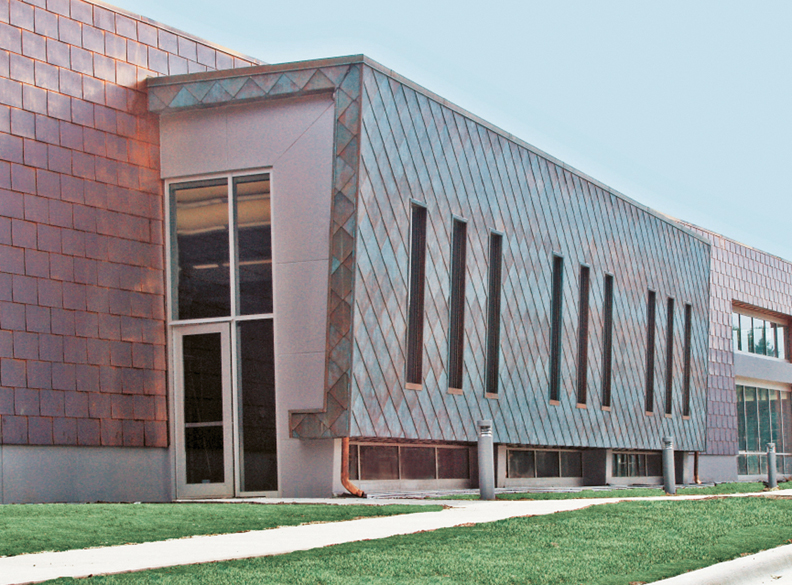As OPN Architects, Cedar Rapids, Iowa, set out to design a new library for the residents of Moline, Ill., they acknowledged the library as an institution has evolved from a traditional space reserved for individual reading and research into an energizing, interactive, technology-based community resource.
OPN envisioned a design that reflected the library’s modern role in society, while remaining true to its traditional character. The firm concluded that a building of contemporary design featuring time-honored building materials would best achieve their design aesthetic. Hallmarks of conservative design, brick, stone, glass, and copper were selected.
OPN saw an opportunity to break copper away from its conventional use and employ it in an innovative, fresh manner--as a building material. They envisioned using decorative copper panels to create the look of a heavy plate copper shingle. The design objective was impressive, but OPN Architects knew using copper in this unique fashion presented two significant challenges: cost and durability. They turned to ALPOLIC Materials for a solution.
OPN Architects recognized that ALPOLIC’s copper composite material offered five significant benefits:
- The use of genuine copper
- Significant cost savings over the use of copper sheets
- The appearance of heavy-gauge copper in a light-weight material
- Durability
- Reduced production and fabrication time
Another challenge of working with copper is the “oil can effect”--the slight undulations that can occur if the copper is not of sufficient gauge. Due to the rigidity of the ALPOLIC panel, the “oil can effect” problem was eliminated.
Project Summary: Moline Public Library
BUILDING TEAM
Owner/developer: City of Moline, Ill.
Architect: OPN Architects
General Contractor: Russell Construction
Fabricator: Metal Design Systems Inc.
Panel Manufacturer: ALPOLIC
Products: 2mm PE Copper Metal; 4mm Mica Platinum
Amount of Material: 18,600-sf
OPN Architects also enlisted the help of Metal Design Systems Inc. (MDS), a fabricator based in Cedar Rapids, Iowa. MDS developed a one-of-a-kind post patina process that provided ALPOLIC’s copper composite with a unique, rich finish. OPN Architects used ALPOLIC’s PE Copper Metal in its un-altered state in tandem with the in-house patina copper. The materials will evolve independently as well as in harmony, creating a distinctive organic finish that will change as the material matures. The copper’s “living” effect mimics the energy of the library itself.
ALPOLIC panels in the Mica Platinum finish were also used on the Moline Public Library project--both on the exterior and interior, providing additional aesthetic appeal and durability.
OPN Architects and MDS agree; ALPOLIC’s copper composite made the Moline Public Library’s innovative design objective possible. BD+C
Related Stories
Adaptive Reuse | Oct 22, 2024
Adaptive reuse project transforms 1840s-era mill building into rental housing
A recently opened multifamily property in Lawrence, Mass., is an adaptive reuse of an 1840s-era mill building. Stone Mill Lofts is one of the first all-electric mixed-income multifamily properties in Massachusetts. The all-electric building meets ambitious modern energy codes and stringent National Park Service historic preservation guidelines.
MFPRO+ News | Oct 22, 2024
Project financing tempers robust demand for multifamily housing
AEC Giants with multifamily practices report that the sector has been struggling over the past year, despite the high demand for housing, especially affordable products.
Performing Arts Centers | Oct 21, 2024
The New Jersey Performing Arts Center breaks ground on $336 million redevelopment of its 12-acre campus
In Newark, N.J., the New Jersey Performing Arts Center (NJPAC) has broken grown on the three-year, $336 million redevelopment of its 12-acre campus. The project will provide downtown Newark 350 mixed-income residential units, along with shops, restaurants, outdoor gathering spaces, and an education and community center with professional rehearsal spaces.
Office Buildings | Oct 21, 2024
3 surprises impacting the return to the office
This blog series exploring Gensler's Workplace Survey shows the top three surprises uncovered in the return to the office.
Healthcare Facilities | Oct 18, 2024
7 design lessons for future-proofing academic medical centers
HOK’s Paul Strohm and Scott Rawlings and Indiana University Health’s Jim Mladucky share strategies for planning and designing academic medical centers that remain impactful for generations to come.
Sports and Recreational Facilities | Oct 17, 2024
In the NIL era, colleges and universities are stepping up their sports facilities game
NIL policies have raised expectations among student-athletes about the quality of sports training and performing facilities, in ways that present new opportunities for AEC firms.
Codes and Standards | Oct 17, 2024
Austin, Texas, adopts AI-driven building permit software
After a successful pilot program, Austin has adopted AI-driven building permit software to speed up the building permitting process.
Resiliency | Oct 17, 2024
U.S. is reducing floodplain development in most areas
The perception that the U.S. has not been able to curb development in flood-prone areas is mostly inaccurate, according to new research from climate adaptation experts. A national survey of floodplain development between 2001 and 2019 found that fewer structures were built in floodplains than might be expected if cities were building at random.
Seismic Design | Oct 17, 2024
Calif. governor signs limited extension to hospital seismic retrofit mandate
Some California hospitals will have three additional years to comply with the state’s seismic retrofit mandate, after Gov. Gavin Newsom signed a bill extending the 2030 deadline.
MFPRO+ News | Oct 16, 2024
One-third of young adults say hurricanes like Helene and Milton will impact where they choose to live
Nearly one-third of U.S. residents between 18 and 34 years old say they are reconsidering where they want to move after seeing the damage wrought by Hurricane Helene, according to a Redfin report. About 15% of those over age 35 echoed their younger cohort’s sentiment.

















